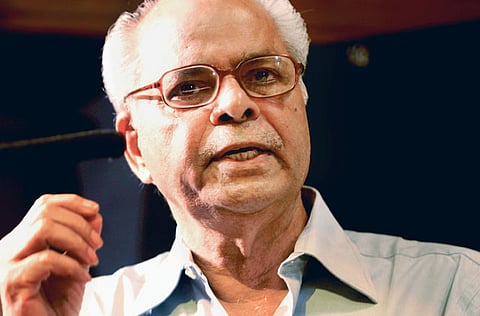India 'has treasure of Arabic documents'
India has three million Arabic documents in its archives, which proves there has been dynamic learning of Arabic in the country for centuries, an eminent Indian historian told an audience in Abu Dhabi.

Abu Dhabi: India has three million Arabic documents in its archives, which proves there has been dynamic learning of Arabic in the country for centuries, an eminent Indian historian told an audience in Abu Dhabi.
Professor K.N. Panicker, one of India's foremost historians and vice-chairman of the Higher Education Council of Kerala, said India and the UAE could co-operate with each other to preserve and utilise that historical knowledge.
The professor was speaking in the Indian Embassy auditorium on Saturday evening about "New Initiatives in Higher Education in India and Their Implication for the Gulf Countries".
He said education was not limited to gaining knowledge and having a career but also to a society's national and cultural identity.
"Therefore it is more conducive to the strengthening of national and cultural identities of Indians and people in the Gulf to enter into educational exchange because their histories contain so many common experiences, common perceptions and the legacy of colonialism," he said.
About 90 per cent of school students in the Gulf countries went on to obtain a higher education whereas in India only 10 per cent of eligible students received the chance for a higher education, Panicker said.
India was undergoing a revolution in its higher education sector, he said. The 11th five-year plan has allocated 9.5 per cent more money for higher education than the previous plan, he said.
India will soon set up 14 innovation universities and 10 central universities. The seats in the Indian Institute of Technology and Indian Institute of Management will also be increased, he said. And the National Knowledge Commission planned to set up 1,500 universities, he said.
Indian's new initiatives in higher education
- 14 innovation universities
- 10 central universities
- 1,500 more universities in future
- 9.5 per cent more money allocated in the 11th five-year plan
- More seats in world famous IITs and IIMs.
- Removing divisions between disciplines
Interaction with Nobel Laureates as part of education reforms
An Indian state has invited 14 Nobel Laureates from various disciplines to its universities to interact with teachers and students, Dr. K.N. Panicker said.
This initiative in Kerala would give brilliant students a new experience, he said. Two Nobel laureates had already visited the state, and their visit had made a huge impact on students and teachers, he told Gulf News.



